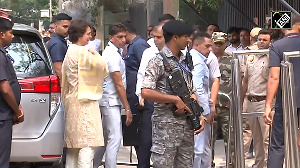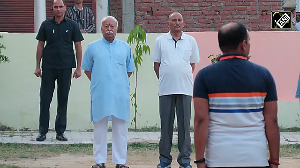Even after the removal of breast tissue, it is possible that the cancer may recur in the chest wall or the area where the surgery was performed, warns Dr Meghal Sanghavi, oncosurgeon at Wockhardt Hospitals.

When American actor Angelina Jolie underwent a preventive double mastectomy in 2013, it was a wake-up call to the women across the world.
The actor successfully raised awareness about the importance of genetic testing and the various preventive surgery options for breast cancer.
Five years later, in 2018, when Tahira Kashyap, actor Ayushman Khurrana's wife, author and filmmaker, was diagnosed with Stage 0 breast cancer (DCIS), she not only underwent a mastectomy, but documented her personal battle into an awareness campaign that broke the taboos around breast cancer in India. She urged women to do regular screenings and take preventive measures to protect their health.
Mastectomy, a preventive or corrective surgery in which one or both breasts are surgically removed partially or completely, is a life-altering decision.
On World Health Day last week, Tahira took to social media to talk about how her cancer had relapsed and how she found out about it during one of her regular screenings.
Tahira's experience has raised concerns among several people, especially women: Can breast cancer reoccur after a double mastectomy?
In a double mastectomy, almost all breast tissue is removed as a part of the surgery. However, every cell may not be taken out; a few may remain under the skin or chest wall.
After a preventive double mastectomy, the risk of developing breast cancer drops significantly by 90 to 95 per cent. In very rare cases, the cancer is likely to develop in the remaining cells.
If you are at risk of breast cancer, here are a few things you must do:
1. Be sure to make follow-up appointments consistently
It's a common misunderstanding to think that everything is okay after your treatment and surgery.
Regular visits to your oncologist are important.
These visits enable us to conduct physical exams, review blood work and order scans if necessary.
Early relapse often presents itself in subtle ways so regular check-ins enable us to spot problems before the symptoms develop.
2. Remain attuned to your body, even after surgery
Even after the removal of breast tissue, it is possible there may be some cancer recurrence in the chest wall or the area where the surgery is performed.
Regular self-exam by patients is recommended, and we encourage them to closely watch their chest area for any anomalies like a new swelling, change in the skin, pain, redness or persistent itching.
Understanding your body allows you to spot anything amiss.
3. Follow the treatment process
Most patients stay on therapy; they either get hormone therapy or targeted therapy for many years.
These medications reduce the risk of cancer relapse, especially for hormone-receptor-positive tumours.
Even if you are alright and feel like these are not required, don't miss your doses or discontinue therapy without a doctor's advice.
4. Keep your weight in check
You need to keep a check on your weight after the treatment.
According to some studies, there are chances of relapse in breast cancer due to obesity.
A proper diet that includes fruit, vegetables and proteins -- along with proper exercise -- can make the body strong and decrease inflammation.
5. Reduce alcohol consumption and give up smoking
Tobacco affects almost every organ and may increase the risk of recurrence of cancer.
Even low alcohol use is linked with increased risk.
We always recommend that smokers stop smoking and decrease alcohol use.
Not only do these changes reduce cancer risk, they also improve overall health.
6. Take care of your stress levels and mental health
For recovery, both physical and emotional healing is important.
Due to stress, both your hormones and immune system can be disturbed.
Yoga, walking, journaling, meditating or therapy sessions can decrease stress. Mental health is an important aspect of physical recovery.
7. Ignoring pain can result in serious problems
Recurring pain, especially if unexplained and involving the bones, joints, the spine or the belly, should never be ignored.
Metastasis, where cancer spreads to the organs, can take place without symptoms at times.
Always consult your oncologist if you experience any new or altered pain so that we can speedily rule out serious causes.
8. Schedule imaging and lab work
Every patient may not need regular scans after treatment but depending on your type and stage of cancer, doctors can advise PET, CT or bone scans.
In some situations, tumour marker blood tests are also be helpful. They are designed to find out about bodily changes before they become bigger problems.
9. Join a support community
If you are learning from others' experiences, recovery can be easy.
Getting to know others' journeys through their lenses can be inspiring and a plan for the way forward.
Hearing their stories may help you recognise your symptoms.
Support groups, whether online or in-person, offer a sense of community and facilitate emotional healing.
10. Keep all your healthcare providers informed
Once you have been diagnosed with cancer, you must mention your case history to other healthcare professionals such as general practitioners, dentists or physiotherapists.
This way, they will be able to help you recognise any early signs in the course of routine tests and make sure they do not give you any medicines that will act against your treatment.
Disclaimer: All content and media herein is written and published online for informational purposes only. It is not a substitute for professional medical advice. It should not be relied on as your only source for advice.
Please always seek the guidance of your doctor or a qualified health professional with any questions you may have regarding your health or a medical condition. Do not ever disregard the advice of a medical professional, or delay in seeking it because of something you have read herein.
If you believe you may have a medical or mental health emergency, please call your doctor, go to the nearest hospital, or call emergency services or emergency helplines immediately. If you choose to rely on any information provided herein, you do so solely at your own risk.
Opinions expressed herein cannot necessarily provide advice to fit the exact specifics of the issues of the person requesting advice.












 © 2025
© 2025